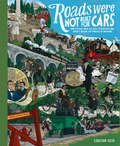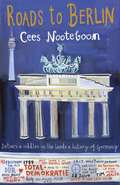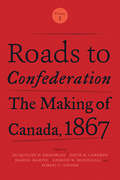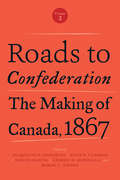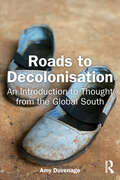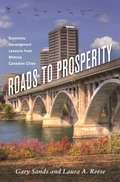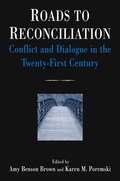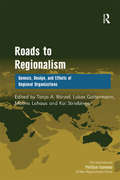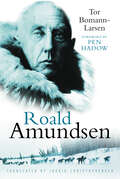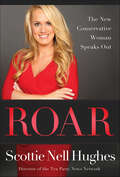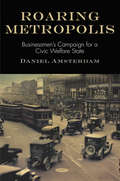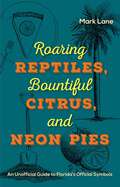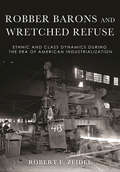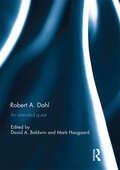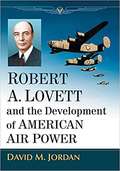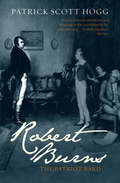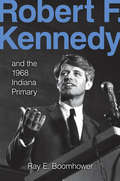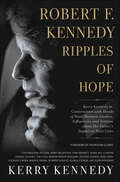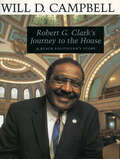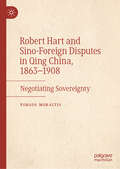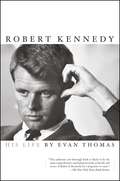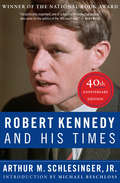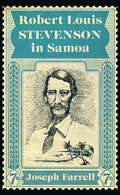- Table View
- List View
Roads Were Not Built for Cars: How cyclists were the first to push for good roads & became the pioneers of motoring
by Carlton ReidIn Roads Were Not Built for Cars, Carlton Reid reveals the pivotal--and largely unrecognized--role that bicyclists played in the development of modern roadways. Reid introduces readers to cycling personalities, such as Henry Ford, and the cycling advocacy groups that influenced early road improvements, literally paving the way for the motor car. When the bicycle morphed from the vehicle of rich transport progressives in the 1890s to the "poor man's transport" in the 1920s, some cyclists became ardent motorists and were all too happy to forget their cycling roots. But, Reid explains, many motor pioneers continued cycling, celebrating the shared links between transport modes that are now seen as worlds apart. In this engaging and meticulously researched book, Carlton Reid encourages us all to celebrate those links once again.
Roads to Berlin
by Cees NooteboomRoads to Berlin maps the changing landscape of Germany, from the period before the fall of the Wall to the present. Written and updated over the course of several decades, an eyewitness account of the pivotal events of 1989 gives way to a perceptive appreciation of its difficult passage to reunification. Nooteboom's writings on politics, people, architecture and culture are as digressive as they are eloquent; his innate curiosity takes him through the landscapes of Heine and Goethe, steeped in Romanticism and mythology, and to Germany's baroque cities. With an outsider's objectivity he has crafted an intimate portrait of the country to its present day.
Roads to Berlin
by Cees NooteboomRoads to Berlin maps the changing landscape of Germany, from the period before the fall of the Wall to the present. Written and updated over the course of several decades, an eyewitness account of the pivotal events of 1989 gives way to a perceptive appreciation of its difficult passage to reunification. Nooteboom's writings on politics, people, architecture and culture are as digressive as they are eloquent; his innate curiosity takes him through the landscapes of Heine and Goethe, steeped in Romanticism and mythology, and to Germany's baroque cities. With an outsider's objectivity he has crafted an intimate portrait of the country to its present day.
Roads to Confederation: The Making of Canada, 1867, Volume 1
by David Cameron Marcel Martel Robert Vipond Jacqueline Krikorian Andrew McDougallIn recognition of Canada’s sesquicentennial, this two-volume set brings together previously published scholarship on Confederation into one collection. The editors sought to reproduce not only the "classic" studies about the people, ideas, and events associated with the passage of the British North America Act, 1867, but also scholarly works that capture the complexities of the Confederation project. This ambitious anthology challenges the notion that there exists one dominant narrative underpinning 1867, and includes research that focuses on Indigenous peoples. Seven articles written in French are translated for the first time for publication in this collection. In the first volume of this anthology, Roads to Confederation introduces readers to the competing approaches to the study of Confederation and provides material that considers the nature of the 1867 project from the perspective of peoples and communities who have been traditionally excluded from the literature. It also includes the definitive scholarship on the ideational underpinnings of the making of Canada as well as several leading articles that set out different ways to understand the nature and purpose of the 1867 agreement.
Roads to Confederation: The Making of Canada, 1867, Volume 2
by David Cameron Marcel Martel Robert Vipond Jacqueline Krikorian Andrew McDougallRoads to Confederation surveys the way in which scholars from different disciplines, writing in different periods, viewed the Confederation process and the making of Canada. Recognizing that Confederation has been traditionally defined as a process affecting only British North America’s Anglophone and Francophone communities, Roads to Confederation offers a broader approach to the making of Canada, and includes scholarship written over 145 years. Volume 2 of this collection focuses on three major themes. It presents research from the perspective of Canada’s regions, with one chapter focusing exclusively on the competing understandings of 1867 from the perspective of Quebec. Next, it includes material pertaining to the geopolitical underpinnings of 1867 that addresses the relationship between Confederation, the U.S. Civil War and American expansionism, Great Britain and war in the European theatre. Also included is leading scholarship by Stanley B. Ryerson, Adele Perry, Fernand Dumond, Ian McKay and James W. Daschuk that questions whether Confederation itself was a formative event. Together with its companion volume, this is an invaluable resource for those who wish to deepen their understanding of the historical foundations on which Canada rests.
Roads to Decolonisation: An Introduction to Thought from the Global South
by Amy DuvenageRoads to Decolonisation: An Introduction to Thought from the Global South is an accessible new textbook that provides undergraduate students with a vital introduction to theory from the Global South and key issues of social justice, arming them with the tools to theorise and explain the social world away from dominant Global North perspectives. Arranged in four parts, it examines key thinkers, activists and theory-work from the Global South; theoretical concepts and socio-historical conditions associated with 'race' and racism, gender and sexuality, identity and (un)belonging in a globalised world and decolonisation and education; challenges to dominant Euro-American perspectives on key social justice issues, linking decolonial discourses to contemporary case studies. Each chapter offers an overview of key thinkers and activists whose work engages with social justice issues, many of whom are under-represented or left out of undergraduate humanities and social sciences textbooks in the North. This is essential reading for students of the humanities and social sciences worldwide, as well as scholars keen to embed Southern thought in their curricula and pedagogical practice.
Roads to Power: Britain Invents the Infrastructure State
by Jo GuldiRoads to Power tells the story of how Britain built the first nation connected by infrastructure, how a libertarian revolution destroyed a national economy, and how technology caused strangers to stop speaking. In early eighteenth-century Britain, nothing but dirt track ran between most towns. By 1848 the primitive roads were transformed into a network of highways connecting every village and island in the nation—and also dividing them in unforeseen ways. The highway network led to contests for control over everything from road management to market access. Peripheries like the Highlands demanded that centralized government pay for roads they could not afford, while English counties wanted to be spared the cost of underwriting roads to Scotland. The new network also transformed social relationships. Although travelers moved along the same routes, they occupied increasingly isolated spheres. The roads were the product of a new form of government, the infrastructure state, marked by the unprecedented control bureaucrats wielded over decisions relating to everyday life. Does information really work to unite strangers? Do markets unite nations and peoples in common interests? There are lessons here for all who would end poverty or design their markets around the principle of participation. Guldi draws direct connections between traditional infrastructure and the contemporary collapse of the American Rust Belt, the decline of American infrastructure, the digital divide, and net neutrality. In the modern world, infrastructure is our principal tool for forging new communities, but it cannot outlast the control of governance by visionaries.
Roads to Prosperity: Economic Development Lessons from Midsize Canadian Cities
by Gary Sands Laura A. ReeseRoads to Prosperity: Economic Development Lessons from Midsize Canadian Cities explores the relative prosperity of midsize Canadian urban areas (population 50,000 to 400,000) over the past two decades. Communities throughout North America have strived for decades to maintain and enhance the prosperity of their residents. In the areas that are the focus of this research, the results of these efforts have been mixed—some communities have been relatively successful while others have fallen further behind the national averages. Midsize cities often lack the resources, both internal and external, to sustain and enhance their prosperity. Policies and strategies that have been successful in larger urban areas may be less effective (or unaffordable) in smaller ones. Roads to Prosperity first examines the economic structure of forty-two Canadian urban regions that fall within the midsize range to determine the economic specializations that characterize these communities and to trace how these specializations have evolved over the time period between 1991 and 2011. While urban areas with an economic base of natural resource or manufacturing industries tend to retain this economic function over the years, communities that rely on the service industries have been much more likely to experience some degree of restructuring in their economies over the past twenty years. The overall trend among these communities has been for their employment profiles to become more similar and for their economic specialization to fade over time. The second part of the book looks at a number of currently popular economic development strategies as they have been applied to midsize urban areas and their success and failures. While there appears to be no single economic development strategy that will lead to greater prosperity for every community, Sands and Reese explore the various factors that help eplain why some work and others don’t. Those with an interest in urban planning and community development will find this monograph highly informative.
Roads to Reconciliation: Conflict and Dialogue in the Twenty-first Century
by Amy Benson Brown Karen M. PoremskiUnlike other books on conflict resolution that focus on particular places and moments in history, this original work attempts to understand the process from many different perspectives and in many different contexts - from international political conflicts, to racial and religious struggles within one culture, to the internal conflicts of individuals struggling with the desire for revenge in the wake of 9/11. Designed as a starting point for meaningful dialogue on the elusive concept of reconciliation, the book includes views from Christians and Muslims, scholars and politicians, and draws on religion, psychology, cultural studies, education theory, history, and law.
Roads to Regionalism: Genesis, Design, and Effects of Regional Organizations (The International Political Economy of New Regionalisms Series)
by Tanja A. Börzel Lukas Goltermann Kai StriebingerOver the past few decades states all around the globe have intensified institutionalized cooperation at the regional level. To deepen our understanding of state-led regionalism, the authors use an analytical framework comprising four main strands. First, they describe and explain the genesis and growth of regional organizations. Second, they account for institutional design, looking at important similarities and differences. Third, they examine the interaction between organizations and member states in an attempt to reveal factors that shape the level of commitment to and compliance with regional initiatives. Finally, they consider the impact of regional organizations on their member states. They conclude by providing a foundation for future research on the dynamic development of regionalism.
Roald Amundsen
by Tor Bomann-Larsen Pen Hadow Ingrid ChristophersonOn 14 December 1911, the Norwegian explorer Roald Amundsen and his team became the first human beings to reach the South Pole, just over a month before Robert Falcon Scott's ill-fated Terra Nova expedition. He had already led the first expedition to traverse the North West Passage, and would go on to lead the first successful attempt to cross the Arctic by air (perhaps even becoming the first to reach the North Pole, according to some interpretations). Yet his personal life was messy to say the least, with a string of mistresses, including Eskimo girls he brought back to Norway, and a poisonous relationship with his brother. He disappeared in 1928 while taking part in an airborne rescue mission in the Arctic; his body was never found. Tor Bomann-Larsen's account of his life is the only full biography of Amundsen to be published in English.
Roar: The New Conservative Woman Speaks Out
by Scottie Nell HughesPopular political news commentator Scottie Nell Hughes tackles the myth of the weak and meek conservative American woman with a fighting spirit that refuses to be intimidated by the mainstream media.
Roaring Metropolis: Businessmen's Campaign for a Civic Welfare State (American Business, Politics, and Society)
by Daniel AmsterdamDebates about poverty and inequality in the United States frequently invoke the early twentieth century as a time when new social legislation helped moderate corporate power. But as historian Daniel Amsterdam shows, the relationship between business interests and the development of American government was hardly so simple.Roaring Metropolis reconstructs the ideas and activism of urban capitalists roughly a century ago. Far from antigovernment stalwarts, business leaders in cities across the country often advocated extensive government spending on an array of social programs. They championed public schooling, public health, the construction of libraries, museums, parks, and playgrounds, and decentralized cities filled with freestanding homes—a set of initiatives that they believed would foster political stability and economic growth during an era of explosive, often chaotic, urban expansion.The efforts of businessmen on this front had deep historical roots but bore the most fruit during the 1920s, an era often misconstrued as an antigovernment moment. As Daniel Amsterdam illustrates, public spending soared across urban America during the decade due in part to businessmen's political activism. With a focus on three different cities—Detroit, Philadelphia, and Atlanta—and a host of political groups—organized labor, machine politicians, African American and immigrant activists, middle-class women's groups, and the Ku Klux Klan—Roaring Metropolis traces businessmen's quest to build cities and nurture an urban citizenry friendly to capitalism and the will of urban capitalists.
Roaring Reptiles, Bountiful Citrus, and Neon Pies: An Unofficial Guide to Florida’s Official Symbols
by Mark LaneWith an eye for the illogical and a flair for the irreverent, journalist Mark Lane aims his sharp wit at one of the most intriguing duties of the Florida legislature—signing state symbols into law. In Roaring Reptiles, Bountiful Citrus, and Neon Pies, he spotlights nineteen things that have been proposed and/or appointed to officially define Florida. Lane guides readers through the often-comic historical events that led to the selection of Florida’s official fruit, tree, gem, bird, song, and other items ranging from the well known to the obscure, packing in personal stories and laugh-out-loud moments along the way. Did you know the state slogan was almost “the alligator state”? Or that a mailbox in the shape of the state marine mammal can tell you a lot about a person? Readers will also discover that the bill proposing the state soil caused a crisis in the Senate and that the state play—written in the peculiar genre of symphonic outdoor drama—puts a heroic spin on the grisly European conquest of St. Augustine. “Full of the kind of unnecessary commentary that might cause trouble,” as Lane describes it, this book is also written with affection toward the wide diversity of lives and experiences that make up the state he calls home. He shows that deciding the things that represent us at any given moment is far trickier than it appears. Especially in Florida, a state aptly symbolized by “a lot of contradictions baked into a Key lime pie.”
Robber Barons and Wretched Refuse: Ethnic and Class Dynamics during the Era of American Industrialization
by Robert F. ZeidelRobber Barons and Wretched Refuse explores the connection between the so-called robber barons who led American big businesses during the Gilded Age and Progressive Era and the immigrants who composed many of their workforces. As Robert F. Zeidel argues, attribution of industrial-era class conflict to an "alien" presence supplements nativism—a sociocultural negativity toward foreign-born residents—as a reason for Americans' dislike and distrust of immigrants. And in the era of American industrialization, employers both relied on immigrants to meet their growing labor needs and blamed them for the frequently violent workplace contentions of the time. Through a sweeping narrative, Zeidel uncovers the connection of immigrants to radical "isms" that gave rise to widespread notions of alien subversives whose presence threatened America's domestic tranquility and the well-being of its residents. Employers, rather than looking at their own practices for causes of workplace conflict, wontedly attributed strikes and other unrest to aliens who either spread pernicious "foreign" doctrines or fell victim to their siren messages. These characterizations transcended nationality or ethnic group, applying at different times to all foreign-born workers.Zeidel concludes that, ironically, stigmatizing immigrants as subversives contributed to the passage of the Quota Acts, which effectively stemmed the flow of wanted foreign workers. Post-war employers argued for preserving America's traditional open door, but the negativity that they had assigned to foreign workers contributed to its closing.
Robert A. Dahl: an unended quest
by David A. Baldwin Mark HaugaardThis book is devoted to the work of Robert A. Dahl, who passed away in 2014. Dahl was one of the most important American political scientists and normative democratic theorists of the post-war era, and he was also an influential teacher who mentored some of the most significant academics of the next two generations of American political science. As an incredibly productive scholar he had a career that spanned more than half a century, his first book was published in 1950 his last was in 2007 at the age of 92. As a political scientist, he was respected even by those who were critical of his works. This theoretical significance and profound influence is reflected in the collection of chapters in this volume, which reads like a ‘who’s who’ of the contemporary US political science scene. His co-author Bruce Stinebrickner documents the evolution of his and Dahl’s seminal text, Modern Political Analysis and how it became the standard introduction to American political science for nearly fifty years. Katharine MacKinnon’s chapter is of significance for its insights upon Dahl and also represents a succinct statement of a feminist reading and critique of contemporary political science. Steven Lukes contributes a highly concise statement of the difference between one-dimensional and three-dimensional power.This work will be a standard reference work for any researchers or those interested in the work of Robert Dahl, among both established academics and students. This book was originally published as a special issue of the Journal of Political Power.
Robert A. Lovett And The Development Of American Air Power
by David M. JordanRobert Lovett grew up in Texas, went to Yale, and earned his wings as a naval air force hero in World War I. He played a key role in the development of the Army Air Force in World War II. His emphasis on strategic bombing was instrumental in defeating Hitler's Germany. During his postwar State Department service, he was influential in initiating the Marshall Plan, the formation of NATO and planning the Berlin Airlift. He served as Truman's Secretary of Defense during the Korean War, was a consultant for his friend Dwight Eisenhower and served John F. Kennedy during the Cuban Missile Crisis. Between tours of duty in Washington, he was an international banker on Wall Street. This first complete biography covers his life and career in detail.
Robert Burns: The Patriot Bard
by Patrick Scott HoggFollowing the 250th anniversary of the birth of Robert Burns (1759-96), Patrick Scott Hogg presents the greatest of Scotland's poets within the true context of his times. Exploding the Burns myth, Robert Burns: The Patriot Bard replaces the ram-stam lad of popular cliché with the real, living Burns - a Scottish patriot of the heart, an idealist who wished for 'Freedom and Liberty' for his beloved country, but also a man who was pragmatically a British patriot and risked his life for democratic reform. Here Burns is painted in his native colours as a highly complex, hyper-intelligent writer in both prose and poetry, not the semi-confused, contradictory simpleton of previous biographies. The fascinating legend of Burns as a ladies' man is placed where it should be - as less important than the message of the bard.The real day-to-day Burns was irascible, stubborn-minded, independent, controversial and opinionated. He detested many of his social superiors within the feudal order and attacked them as hypocrites and oppressors of the common people. The voice of Burns, always in the language of the people, and his idealist vision of a better world endeared him as a poet of humanity 'the world o'er'. Drawing from Burns' existing canon of poetry and letters, plus some newly attributed works suppressed for over two centuries, this life story is a roller-coaster narrative that charts the success and untimely death of the greatest songwriter of all time, the real Robert Burns.
Robert F. Kennedy: And the 1968 Indiana Primary
by Ray E. BoomhowerThis account of a dramatic moment, and a classic speech, is &“a must-read for anyone interested in presidential politics&” (Indiana Magazine of History). On April 4, 1968, Senator Robert F. Kennedy Jr., arrived in Indiana to campaign for the state&’s Democratic presidential primary. As Kennedy prepared to fly from an appearance in Muncie to Indianapolis, he learned that civil rights leader Dr. Martin Luther King Jr., had been shot outside his hotel in Memphis, Tennessee. Before his plane landed in Indianapolis, Kennedy heard the news that King had died. Despite warnings from Indianapolis police that they could not guarantee his safety, and concerns from his own staff, Kennedy decided to proceed with plans to address an outdoor rally to be held in the heart of the city&’s African American community. On that cold and windy evening, Kennedy broke the news of King&’s death in an impassioned, extemporaneous speech on the need for compassion in the face of violence. It has proven to be one of the great speeches in American political history. This book explains what brought the politician to Indiana that day, and explores the characters and events of the 1968 Indiana Democratic presidential primary—in which Kennedy, who had been an underdog, would go on to a decisive victory.
Robert F. Kennedy: Kerry Kennedy in Conversation with Heads of State, Business Leaders, Influencers, and Activists about Her Father's Impact on Their Lives
by Kerry KennedyThe daughter of Robert F. Kennedy shares personal remembrances of her father and through conversations with politicians, media personalities, celebrities and leaders, explores the influence that he continues to have on the issues at the heart of America's identity. Robert F. Kennedy staunchly advocated for civil rights, education, justice, and peace; his message transcended race, class, and creed, resonating deeply within and across America. He was the leading candidate for the Democratic nomination for the presidency and was expected to run against Republican Richard Nixon in the 1968 presidential election, following in the footsteps of his late brother John. After winning the California presidential primary on June 5, 1968, Robert Kennedy was shot, and he died the following day. He was forty-two.Fifty years later, Robert Kennedy's passions and concerns and the issues he championed are -- for better and worse-still so relevant. Ripples of Hope explores Kennedy's influence on issues at the heart of America's identity today, including moral courage, economic and social justice, the role of government, international relations, youth, violence, and support for minority groups, among other salient topics.Ripples of Hope captures the legacy of former senator and U.S. attorney general Robert F. Kennedy through commentary from his daughter, as well as interviews with dozens of prominent national and international figures who have been inspired by him. They include Barack Obama, John Lewis, Marian Wright Edelman, Alfre Woodard, Harry Belafonte, Bono, George Clooney, Gloria Steinem, and more. They share personal accounts and stories of how Kennedy's words, life, and values have influenced their lives, choices, and actions. Through these interviews, Kerry Kennedy aims to enlighten people anew about her father's legacy and bring to life RFK's values and passions, using as milestones the end of his last campaign and a life that was cut off much too soon.Thurston Clarke provides a powerful foreword to the book with his previous reporting on RFK's funeral train.
Robert G. Clark's Journey to the House
by Will D. CampbellThis biographical profile written by one of the South's most notable authors traces the life of Robert George Clark Jr. (1928-2025) from his Jim Crow boyhood in Ebenezer, Mississippi, through his notable career as the first Black Mississippian since Reconstruction to be elected to the Mississippi House of Representatives. In this compelling book Will D. Campbell fuses Clark's family history with his political career and tells of Clark's struggle with segregationists, his powerful influence in the passing of the state's 1982 Education Reform Bill, and the continued influence of his work on Mississippi politics and culture. Based on interviews, research, and primary sources, Campbell's book is an evocative, fascinating, and elegantly written portrait of a man who shaped the culture of contemporary Mississippi. In details of Clark's days as a student at Jackson State University, Campbell's narrative depicts Clark both as a strong individual and as a symbol of African American civil rights activism. As he follows Clark's progress as a politician, educator, and civil rights advocate, he showcases a history of race relations and racial politics in Mississippi during the state's most turbulent era. In this steamy cauldron, however, Campbell never loses sight of Clark's singular life and notable accomplishments. Robert G. Clark's Journey to the House unites one of Mississippi's foremost citizens of the twentieth century and one of the state's most notable literary voices. During the civil rights struggle, the lives of Clark and Campbell were in interplay. This striking book, a valuable addition to the ever-growing documentary literature of the civil rights movement, shows that their lives and philosophies continued to converge.
Robert Hart and Sino-Foreign Disputes in Qing China, 1863-1908: Negotiating Sovereignty
by Yorgos MoraitisThis book investigates the role of Sir Robert Hart in China&’s early engagement with Western international law, covering the period from Hart&’s earliest days as Inspector General of the foreign-dominated Chinese Imperial Maritime Customs (CIMC) to his final years in China (1863-1908). Drawing on Hart&’s personal records, particularly his diaries and correspondence with CIMC officials and various political figures, as well as Customs Service official publications, records of the British Foreign Office, Chinese official papers, newspapers, and other contemporary publications, the book focuses on Sino-foreign jurisdictional disputes in which Hart was involved. They are used as case studies to examine his role – and more broadly, that of the CIMC – in influencing contemporary perceptions in the West about China&’s status vis-à-vis Western nation-states. Going beyond portraying Hart as a mere broker, the book delves into his complex and multi-faceted character. It examines his idiosyncratic approach to Qing engagement with the West, particularly focusing on his proposals for dealing with international institutions. While these proposals had the potential to strengthen China, they sought to do so largely on Western terms, ultimately undermining China's ability to function as an independent state. By analysing Hart's character and his engagement with Western international law, the author aims to provide a nuanced understanding of the complexities surrounding Qing China's interaction with the West. It highlights the ambivalence exhibited by both Qing and Western officials, emphasising the challenges and opportunities in negotiations based on Western legal principles. Contributing to discussion on whether international structures could be utilised to bolster Qing sovereignty, this book will provide insights for those researching Chinese history, diplomatic history and international relations, and international law.
Robert Kennedy
by Evan ThomasHe was "Good Bobby," who, as his brother Ted eulogized him, "saw wrong and tried to right it . . . saw suffering and tried to heal it." And "Bad Bobby," the ruthless and manipulative bully of countless conspiracy theories. Thomas's unvarnished but sympathetic and fair-minded portrayal is packed with new details about Kennedy's early life and his behind-the-scenes machinations, including new revelations about the 1960 and 1968 presidential campaigns, the Cuban Missile Crisis, and his long struggles with J. Edgar Hoover and Lyndon Johnson.
Robert Kennedy and His Times
by Arthur M. Schlesinger Jr.The Pulitzer Prize–winning historian chronicles the short life of the Kennedy family&’s second presidential hopeful.Schlesinger&’s account vividly recalls the forces that shaped Robert Kennedy, from his position as the third son of a powerful Irish Catholic political clan to his concern for issues of social justice in the turbulent 1960s. Robert Kennedy and His Times is &“a picture of a deeply compassionate man hiding his vulnerability, drawn to the underdogs and the unfortunates in society by his life experiences and sufferings&” (Los Angeles Times). This fortieth anniversary edition contains not only Schlesinger&’s illuminating and inspiring portrait of Robert Kennedy, but a new introduction by Michael Beschloss, in which the acclaimed bestselling author and historian discusses the book&’s initial reception, Schlesinger&’s thoughts on it, and expounds on why Robert Kennedy is still such an important figure today.&“Exceptionally important, one of a handful of books that anyone who cares for the politics of the &’60s must read.&” —Newsweek&“An absorbing and vividly written study of a gallant and tragic man.&” —The Boston Globe &“A story that leaves the reader aching for what cannot be recaptured.&” —Miami Herald &“An inspiring account of what it was like to be at Robert Kennedy&’s side and why he and many like him felt that vision and virtue walked with them.&”—Business Week
Robert Louis Stevenson in Samoa
by Joseph FarrellShortlised for the Saltire Society Non Fiction Book of the Year Award Almost every adult and child is familiar with his Treasure Island, but few know that Robert Louis Stevenson lived out his last years on an equally remote island, which was squabbled over by colonial powers much as Captain Flint's treasure was contested by the mongrel crew of the Hispaniola.In 1890 Stevenson settled in Upolu, an island in Samoa, after two years sailing round the South Pacific. He was given a Samoan name and became a fierce critic of the interference of Germany, Britain and the U.S.A. in Samoan affairs - a stance that earned him Oscar Wilde's sneers, and brought him into conflict with the Colonial Office, who regarded him as a menace and even threatened him with expulsion from the island.Joseph Farrell's pioneering study of Stevenson's twilight years stands apart from previous biographies by giving as much weight to the Samoa and the Samoans - their culture, their manners, their history - as to the life and work of the man himself. For it is only by examining the full complexity of Samoa and the political situation it faced as the nineteenth century gave way to the twentieth, that Stevenson's lasting and generous contribution to its cause can be appreciated.
